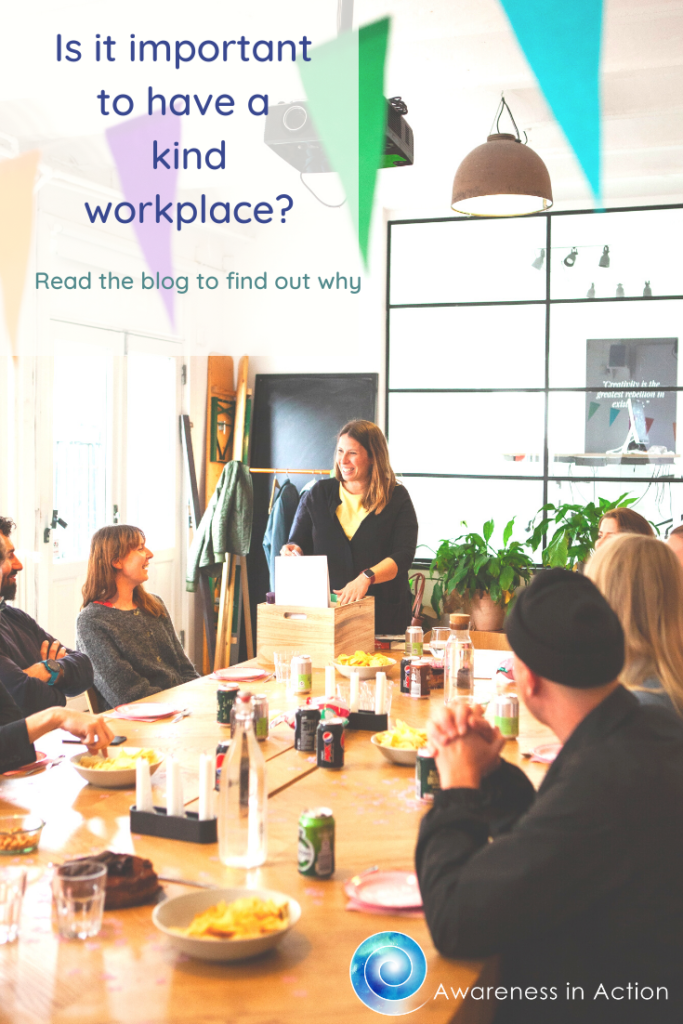
Is it Important to Have a Kind Workplace?
Take a moment to think about your workplace. Would you say it was a kind workplace? Is kind behaviour encouraged, or considered important?
All too often kindness is simply seen as a ‘soft skill’ and not considered to be necessary for navigating the complexities of work. This is a shame because focusing on kindness provides tremendous strength and flexibility to any workplace.
Stress at work
There are lots of quite worrying statistics about stress and its effects in the workplace. First off – stress is expensive. When people are stressed they are not functioning at their best and they tend to get sick.
The statistics bear this out. The Health & Safety Exec states that in 2017/18 15.4 million working days were lost in the UK as a result of stress. Across the pond, the American Psychological Association estimates that more than $500 billion is siphoned off from the U.S. economy because of workplace stress, and 550 million workdays are lost each year due to stress on the job.
The effect on staff
Moreover, engagement in work — which is associated with feeling valued, secure, supported, and respected — is generally negatively associated with a high-stress, cut-throat culture. It people do not feel valued and respected at work, then they tend to disengage and this has consequences.
In studies by the Queens School of Business and by the Gallup Organization, disengaged workers had 37% higher absenteeism, 49% more accidents, and 60% more errors and defects. Similarly, in the UK it is estimated that disengaged employees are costing the UK economy £340 billion every year in lost training and recruitment costs, sick days, productivity, creativity and innovation.
This also affects staff loyalty and the rate at which people leave to look for new jobs.
Consumer expectation
Increasingly consumers are more alert to companies’ ethical positions. With Statistics from recent consumer polls by Edelman, and Young & Rubicam, show that 87% of UK consumers expect companies to consider societal interests equal to business interests, while 71% of people make it a point to buy brands from companies whose values are similar to their own.
Looking at this sample of statistics, we can see that the environment of a workplace definitely has an effect on the people who work in it. If the atmosphere is not healthy, there are strong repercussions. So, maybe a kind workplace culture could turn out to be much more of an investment for employers that they thought.
What is so special about kindness?
From a Buddhist perspective, generating loving kindness is a way of wishing people happiness. It is an antidote to anger. If you think about it – it’s hard to be angry with someone and do something kind for them at the same time.
Kindness also makes us happier because we feel good when we are kind. In his research with volunteers, Allan Luks identified a Helper’s High that people experienced when they volunteered due to the release of dopamine in their brains.
It is also good for the heart because acts of kindness are associated with emotional warmth. This produces the hormone oxytocin which has an effect of causing blood vessels to dilate and so eases blood pressure.
We all like to be around kind people. Kindness reduces the emotional distance between people, and we feel bonded. So, kindness helps us to connect and improves relationships.
A great thing about kindness is that it is contagious. When we see people being kind to each other—we don’t even need to be directly involved—we feel good ourselves. Then we are more likely to go on to do something kind for someone else.
So, a kind workplace would be one in which employees were happier, geared to helping each other and healthier. It would also mean an improvement in relationships between staff but also with suppliers, customer and clients.
How would a kind workplace be?
Here are a few thoughts on some basic elements that would assist in ensuring that kindness is valued in a workplace. It’s by no means exhaustive.
• Staff would not need to assume a persona to succeed
It’s a strange fact of our lives but we spend more time with the people we work with than our friends and family. We see them most days—whatever is happening in our lives and however we feel. The thing is that all too often we feel that we need to wear a mask at work. A mask that says that we have ourselves together and are not affected by emotions.
Actually, it’s a pity if we feel this way. To begin with, it’s not true. Of course, we are affected by emotions and the things we need to cope with. By hiding this at work and pretending to be something else, we are cutting off a source of connection and even empathy.
Naturally we are at work to carry out a job and to do it to the best of our ability, but this does not mean that we have to behave like machines. We can be honest about how we are and how we are doing.
• People would be willing to lend a helping hand
With that kind of honesty in a workplace, it becomes much more possible to offer support to colleagues when they are struggling. If someone is having a hard time they don’t need to feel like a failure, or that they are letting anyone down. Knowing that it is alright to acknowledge struggle and to ask for help when it’s needed can be a tremendous source of relief. It opens the possibility to deepen relationships and to learn and grow together.
• Blame would not be a fallback response and mistakes could be forgiven
How easy it is to blame someone else for the inevitable mistakes that occur in any workplace. This tends to happen more in a work environment that is particularly competitive and aggressive.
Managers have a big role to play here. They need to create a culture where mistakes are understood as opportunities to learn, rather than failures to be punished. Staff could be encouraged to experiment and take reasonable risks. Managers could provide support to increase their confidence. Knowing that you will be blamed if something you are working on goes wrong increases stress and decreases improvisation.
• The meaningfulness of the work would be a priority
Generally speaking, we all look for meaning and purpose in our work. We want to know that we are using our time well and contributing to something bigger than ourselves. The very process of developing kindness in the workplace is itself connecting staff to a greater purpose.
Managers can enhance this by encouraging kindness and by sharing stories of how this connects to the company’s values.
• People wanting to inspire one another at work
A workplace based on kindness would function as an interdependent unit. There would be a holistic view of the workforce. In such an environment, individuals would realise that just as they need encouragement and inspiration, so do other people. So, it would be natural for people to want to inspire and encourage each other.
• People could treat each other with respect, gratitude and integrity
Learning to respect other people’s opinions is not always easy – especially if you disagree with them. A kind workplace would take respect as a foundation for difficult conversations and working through challenges. Allowing people to express themselves and to be heard is a mark of respect. Dialogue and exchange will go more smoothly in such circumstances.
Appreciating the efforts that people make and being grateful for their contribution is also fundamental to a kind workplace. It does not have to be a big thing. It can be simply being grateful for a friendly greeting, or the offer of a cup of coffee. Showing your appreciation makes the other person feel seen and respected.
This is the first of a series of posts on kindness in the workplace. I would love to hear your response and your ideas about how to bring this into action.

If you have found the ideas in this post interesting you might like to look at my new online course, How to Make Kindness Matter at Work. You can find out more here.

